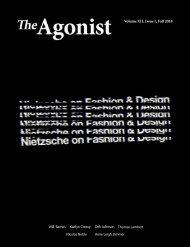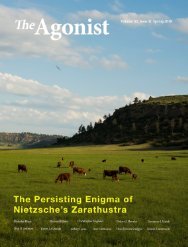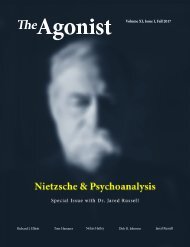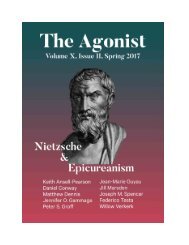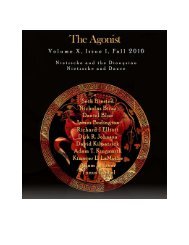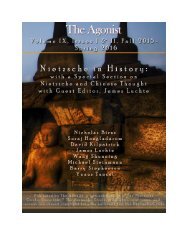Volume XII, Issue II, Spring 2019
Create successful ePaper yourself
Turn your PDF publications into a flip-book with our unique Google optimized e-Paper software.
PETER S. GROFF<br />
On the Blissful Islands with Nietzsche and<br />
Jung —Paul Bishop<br />
(London and New York: Routledge pp. 237, 2017. ISBN:<br />
978-1-138-79162-6)<br />
Peter S. Groff<br />
The author of this unusual and fascinating monograph is an intellectual<br />
historian whose interests extend well beyond Nietzsche to encompass Weimar<br />
classicism, 20 th century analytical psychology and classical Greek and Hellenistic<br />
philosophy. Although this may at first sound like a strange juxtaposition, Bishop’s<br />
previous studies have made a compelling case that vital aspects of Nietzsche’s<br />
thought come sharply into focus when he is read in relation to figures such as<br />
Goethe and Schiller on the one hand and Jung on the other, with an eye to certain<br />
formative themes and metaphors in the Platonic tradition. What we find when we<br />
set these thinkers in dialogue with one another is a distinct intellectual-spiritual<br />
lineage predominantly concerned with the possibilities of self-transformation.<br />
Bishop’s interpretative approach is perhaps closest to Pierre Hadot in this respect,<br />
albeit more oriented towards modern German thought and uniquely informed by<br />
Jungian depth psychology.<br />
His latest book, On the Blissful Islands with Nietzsche and Jung, demonstrates<br />
effectively the kind of rich and resonant Nietzsche interpretation that can come<br />
from such a catholic approach. 1 The exegetical scope of the study would initially<br />
appear rather modest, focusing on a short passage from Thus Spoke Zarathustra,<br />
which occurs at the end of the speech entitled “On the Blissful Islands”:<br />
Ah, you men, I see an image sleeping in the stone, the image of my visions! Ah<br />
that it must sleep in the hardest, ugliest stone!<br />
Now my hammer rages fiercely against its prison. Fragments fly from<br />
the stone: what is that to me?<br />
1 It should be noted that this book is just as much a study of Jung as it is a study of<br />
Nietzsche. I focus here primarily on the latter, however, given the specific context of the<br />
review.<br />
53



